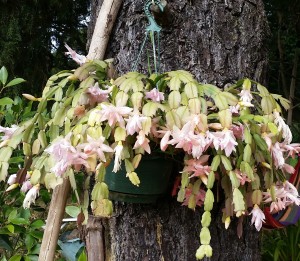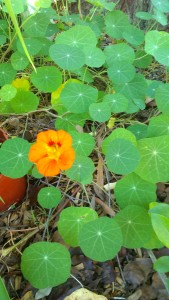Easy organic gardening when you have no garden.
Hanging gardens are the latest trend in urban horticulture. You can plant vertically up walls or in containers hanging from the rafters.
Advantages for you in planting hanging gardens
- saves space

Flowering hanging pot plant hanging from a tree - attractive
- versatile in that you can plant anything from easy to care for succulents and air plants, to more fussy flowering plants, herbs and kitchen gardens
- saves money when planting food like salads, vegetables and herbs
- planting food is a great skill to pass onto your children and grandchildren.
Collecting suitable interesting containers
Go for a variety of shapes, colours and materials, including:
- retired buckets with holes
- chip fryers
- metal fruit holders
- wire baskets
- retro candelabras
- old rusty colanders.
Be creative: stop in at second-hand shops, car boot or garage sales and charity shops. There are always bargains to be had.
All you need to get started:

- container
- hanging wire and hooks
- liner of choice (coconut fibre, peat moss or recycled garden bags)
- plants
- good healthy soil.
Your soil should be a mixture of compost, peat and vermiculite. Peat will add light acidity, vermiculite will assist drainage and compost will make the soil fertile.
Suggestions for your food hanging garden
Planting three or four plants per container is ideal, allowing room for growth. Try:
- cherry or grape tomatoes
- snow peas

Nasturtiums are perfect for hanging gardens. - basil / other herbs (companion plants)
- lettuces
- strawberries
- small Asian eggplant
- small peppers
- mizuna
- mustard greens
- chives, mint and thyme
- nasturtiums.
Top tips
- Use nutrient rich soil.
- Protect from strong winds.
- Provide good drainage.
- Place in correct lighting.
- Feed regularly with liquid organic fertiliser.
- Water regularly as they dry our more easily than in the garden.
It is not difficult to grow food in hanging gardens. It takes a little planning, patience and knowledge of planting techniques.
For more organic gardening tips please subscribe to my newsletter and YouTube channel at top right hand side of this page.